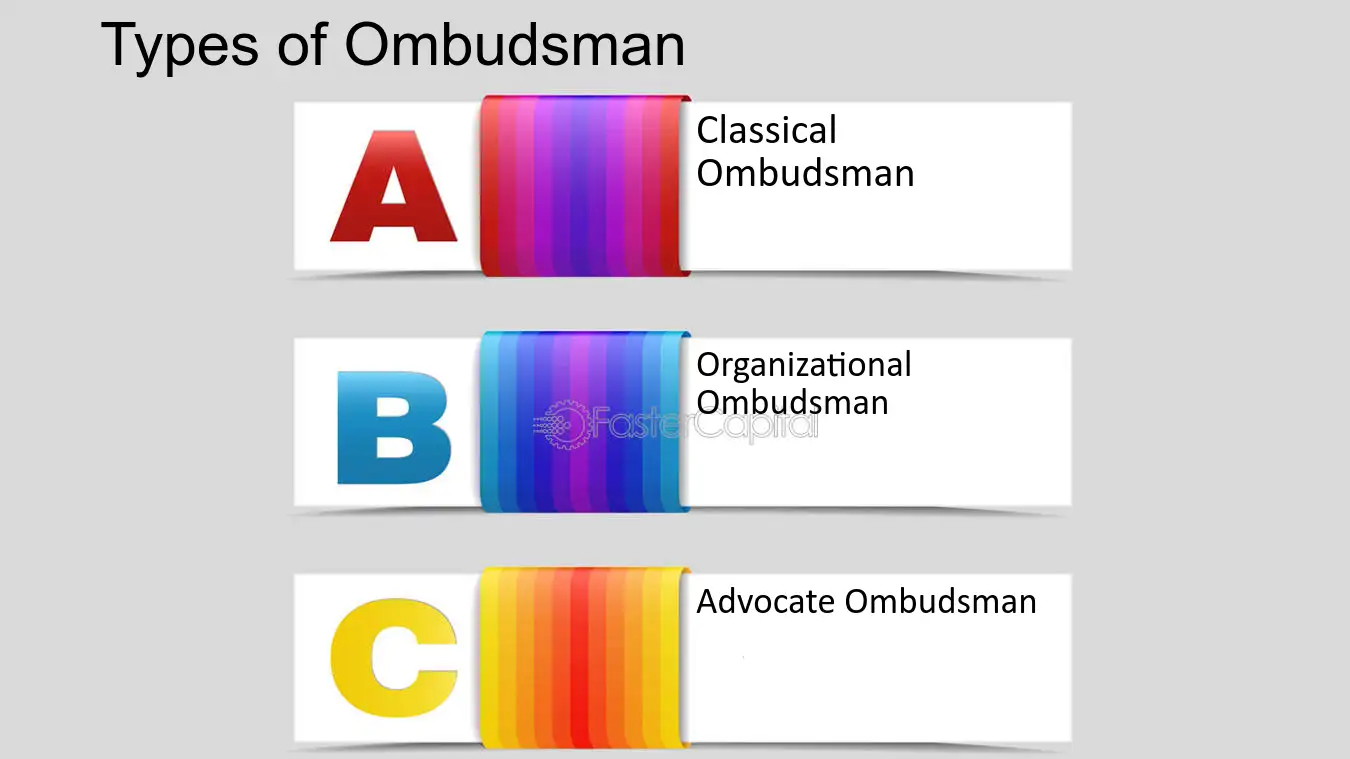Types of Ombudsman
There are various types of ombudsman that exist to address different areas of concern and provide assistance to individuals and organizations. Some of the common types of ombudsman include:
- Government Ombudsman: This type of ombudsman is appointed by the government to investigate complaints against government agencies and ensure that they are functioning effectively and ethically.
- Corporate Ombudsman: A corporate ombudsman is typically employed by a company to handle internal complaints and conflicts, serving as a neutral party to resolve disputes and promote fairness within the organization.
- Healthcare Ombudsman: Healthcare ombudsmen are responsible for addressing patient complaints and concerns within the healthcare system. They work to ensure that patients receive proper care and that their rights are protected.
- Consumer Ombudsman: Consumer ombudsmen advocate for consumer rights and handle complaints related to products or services. They work to mediate between consumers and businesses to find fair resolutions.
- Media Ombudsman: Media ombudsmen are responsible for addressing complaints related to media organizations, such as biased reporting or invasion of privacy. They work to ensure that media outlets adhere to ethical standards.
- Academic Ombudsman: Academic ombudsmen assist students, faculty, and staff in resolving conflicts and addressing concerns within educational institutions. They may handle issues related to grading, discrimination, or other academic matters.
These are just a few examples of the types of ombudsman that exist. Each type serves a specific purpose and plays a crucial role in ensuring fairness, accountability, and resolution in various sectors of society.
Advantages and Disadvantages of the Ombudsman System
The ombudsman system, which is designed to provide an independent and impartial avenue for resolving disputes and addressing grievances, offers several advantages. However, it also has its limitations and disadvantages.
Advantages

1. Independence: One of the key advantages of the ombudsman system is its independence. Ombudsmen are typically appointed to their positions for fixed terms and are not easily influenced by external pressures. This independence allows them to act as neutral mediators and make unbiased decisions.
2. Accessibility: Ombudsmen are accessible to all individuals, regardless of their social status or financial means. They provide a free and informal channel for people to voice their concerns and seek resolutions. This accessibility ensures that even marginalized or vulnerable populations can access justice and have their grievances heard.
4. Confidentiality: Ombudsmen maintain strict confidentiality when handling complaints or inquiries. This confidentiality encourages individuals to come forward without fear of reprisal or retaliation. It also allows for open and honest communication between the parties involved, facilitating the resolution of disputes.
Disadvantages

1. Limited Powers: Ombudsmen often have limited powers and authority. They can only make recommendations or suggestions for resolving issues and do not have the power to enforce their decisions. This limitation may hinder their ability to effectively address certain grievances or bring about meaningful change.
2. Lack of Binding Decisions: As mentioned earlier, ombudsmen can only make non-binding recommendations. This means that their decisions are not legally enforceable, and the parties involved are not obligated to comply with them. This lack of binding decisions may undermine the effectiveness of the ombudsman system in certain cases.
3. Limited Scope: Ombudsmen are typically focused on specific sectors or areas, such as government agencies, corporations, or educational institutions. This limited scope may result in certain issues falling outside the purview of the ombudsman system. Individuals with grievances in areas not covered by an ombudsman may not have access to the same level of support and assistance.
4. Potential for Bias: While ombudsmen are expected to be impartial, there is always the potential for bias or conflicts of interest. Ombudsmen may have personal or professional connections that could influence their decision-making process. This potential for bias may undermine the perceived fairness and credibility of the ombudsman system.

Emily Bibb simplifies finance through bestselling books and articles, bridging complex concepts for everyday understanding. Engaging audiences via social media, she shares insights for financial success. Active in seminars and philanthropy, Bibb aims to create a more financially informed society, driven by her passion for empowering others.
